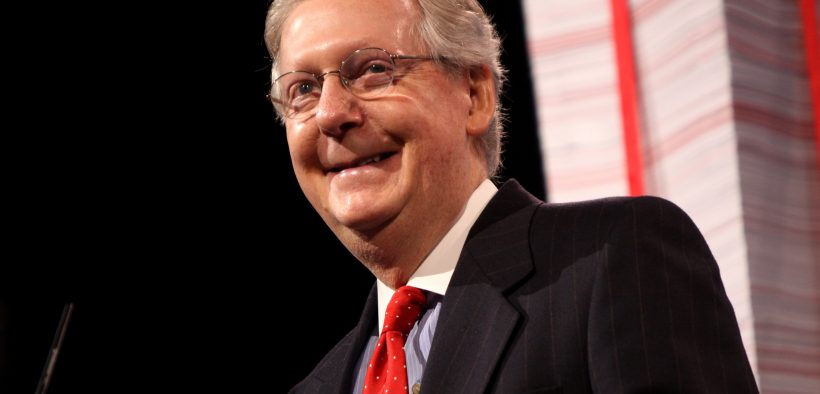McConnell Received Record Big Pharma Donations During Drug Negotiations

“McConnell’s opposition to the bill comes after he had an exceptional quarter of fundraising from executives and PACs of pharmaceutical companies that could be forced to reduce the prices of their drugs under Medicare if Pelosi’s bill becomes law.”
Shortly after President Trump tweeted about his willingness to pass a Democratic House bill that would require Medicare to negotiate the prices of some essential drugs, McConnell vowed to block the legislation:
“Socialist price controls will do a lot of left-wing damage to the health care system. And of course we’re not going to be calling up a bill like that,” McConnell told Politico.
But as Sludge reported in October, McConnell’s huge donations from the pharmaceutical industry may have been his true motivation in blocking the drug pricing legislation:
“McConnell’s opposition to the bill comes after he had an exceptional quarter of fundraising from executives and PACs of pharmaceutical companies that could be forced to reduce the prices of their drugs under Medicare if Pelosi’s bill becomes law. From July 1 to Sept. 30, McConnell’s joint fundraising committee and campaign committee raised $195,300 from executives and PACs of pharmaceutical companies, according to third-quarter Federal Election Commission filings reviewed by Sludge.
“The CEOs of Abbvie, Bristol-Myers Squibb, Merck, Pfizer, Roche Pharmaceuticals, and Sanofi each contributed $15,600 to McConnell’s joint fundraising committee in the third quarter. Novo Nordisk Executive Vice President Doug Langa chipped in $10,000, Amgen CEO Robert Bradway gave $7,500, and Celgene CEO Mark Alles contributed $5,000.”
As Citizen Truth wrote earlier this year, major pharmaceutical companies once again hiked prices on more than 250 drugs as the new year began.
“Big Pharma has outsize influence in D.C., and as a direct result of the rigged drug pricing system manufactured by this influence, patients across America are rationing medication, going without food, going bankrupt and dying because they can’t afford prescription drugs,” Juliana Keeping, communications director at Patients for Affordable Drugs, told Sludge. “That’s why we’re urging lawmakers on both sides of the aisle to pass reforms with the sense of urgency patients deserve.”
As Citizen Truth reported last month, a record 25% of Americans told Gallup last month that they or a family member had deferred treatment for a serious medical condition because they couldn’t afford care.
A Harvard study last year found that “prices of labor and goods, including pharmaceuticals and devices, and administrative costs appeared to be the main drivers of the differences in spending,” between the U.S. healthcare system and the systems of other rich nations.
Trump also abandoned his pledge to lower prices after meeting with pharma lobbyists. House Democrats passed a bill in December that would allow the government to negotiate some of the costliest essential drugs, but Trump slammed the bill with the traditional Republican argument that negotiation would impede development of new drugs.
Economist Mariana Mazzucato challenges this idea, arguing that the U.S.’ current model is “incentivised to set high prices and deliver short-term returns to shareholders, rather than focus on riskier, longer-term research.”
Further, Mazzucato points out that much innovation is publicly funded. “While taxpayers are largely footing the bill for drug research, pharmaceuticals are reaping all the gains.”
The pharmaceutical industry collected around $440 billion from sales in the U.S. alone in 2018, spending only about $70 billion on research, one-sixth of the money it took in. Mazzucato notes that the industry spends more on stock buybacks than research and development.















